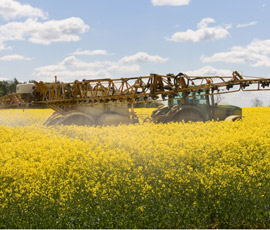Syngenta urges MPs to focus on ‘real threats to bees’

Growers could see millions wiped off the value of oilseed rape, sugar beet and cereal crops if valuable pesticides claimed to be linked to a decline in bee health are withdrawn, crop experts warn.
A restriction or ban on the use of neonicotinoid seed treatments in this country could even make growing some crops “economically unviable”, according to Swiss agrichemical company Syngenta.
The warning comes as parliament’s Environmental Audit Committee (EAC) hears evidence this week for and against the retention of neonicotinoid pesticides, which have been linked to bee colony collapse.
In September, DEFRA rejected calls for a ban on neonicotinoids, saying despite numerous studies, there was no “unequivocal” evidence they were harmful to bees or other pollinators – even though they had been banned in other countries, including France and Germany.
Amid increasing pressure from conservation groups, DEFRA secretary Owen Paterson has asked government officials to examine the practical consequences of a ban or restriction over the use of neonicotinoid pesticides.
Syngenta, which is due to submit evidence this week to the EAC panel, said the potential loss of its neonicotinoid seed treatment Cruiser OSR would be a “devastating blow” to farmers.
Mark Titterington, head of corporate affairs for the European, African and Middle East branch of Syngenta, said: “There are bee health declines in certain upland areas of Switzerland where there are no neonicotinoids used. In contrast, there is no significant decline in bee health in Australia but neonicotinoids are widely used. This committee enquiry does not properly address these facts.
“Based on previous statements, we believe this committee is in danger of pinpointing the bee colony decline on a single pesticide when there are other important factors at play, such as climate change, habitat, and the varroa mite (a serious pest of honeybee colonies).”
Syngenta is concerned that the EAC panel will recommend restrictions over the use of neonicotinoids, which could influence decisions over the future availability of such products at EU level.
The European Food Safety Agency (EFSA) has been asked by the European Commission to conduct an in-depth review into pesticides and their possible effects on bee health. The report is due to be published in early 2013.
“There are bee health declines in certain upland areas of Switzerland where there are no neonicotinoids used. In contrast, there is no significant decline in bee health in Australia but neonicotinoids are widely used. This committee enquiry does not properly address these facts.”
Mark Titterington, Syngenta
Mr Titterington defended the safety record of Cruiser OSR, saying there had “not been a single verifiable case” of bee colony disorder caused by the product after it has been used correctly across millions of hectares of oilseed rape in Europe.
Studies carried out by Syngenta have shown that the loss of Cruiser OSR, which includes the active ingredient thiamethoxam, would be a huge blow to UK crop yields, Mr Titherington said.
“If we take a crop like winter wheat, the farmer would go from a net profit to a net loss in many parts of the UK,” he said.
“Cruiser OSR has been shown to increase yields in oilseed rape by 0.6t/ha. Without it, you could be looking at a double digit reduction in rape yields.”
Syngenta said for every £1 spent by British growers on Cruiser OSR it returned £20 in terms of yield.
Steve Beal, Syngenta head of seed treatment for Europe, said Cruiser was a vital product for early season control of damaging autumn crop pests.
“Establishment of oilseed rape in the autumn going into the winter is absolutely critical. No more so than this autumn where many thousands of oilseed rape crops that were established have been written off.
“Without Cruiser, control of flea beetle and aphids in oilseed rape would be impossible.”
However, the Soil Association said it was “hardly surprising” that Syngenta has leapt to the defence of the rapidly growing market for neonicotinoid seed dressings.
A Soil Association spokeswoman said: “Our evidence to the EAC included research from Italy which showed that after a suspension of neonicotinoids used on maize, bee deaths halved and farmer profits stayed the same. If we lose pollinators; it has been estimated that it would cost £1.8bn per year to pollinate crops by other means.
“Over 30 scientific studies over the last three years have shown adverse impacts on pollinators from neonicotinoids. Varroa mite is a problem for honey bees, but scientific research found that neonicotinoid pesticides delay bees hatching out, thus giving the mites longer to kill the bees.
In Australia, even without the varroa mite, some beekeepers are reporting heavy losses. And of course varroa mites don’t affect wild pollinators which carry out over 90% of pollination.
